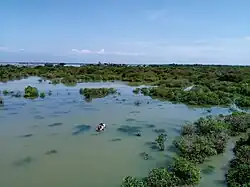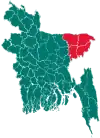Gowainghat
গোয়াইনঘাট | |
|---|---|
 View of Ratargul Swamp Forest | |
.svg.png.webp) | |
| Coordinates: 25°6.2′N 91°53.5′E / 25.1033°N 91.8917°E | |
| Country | |
| Division | Sylhet |
| District | Sylhet |
| Area | |
| • Total | 481.12 km2 (185.76 sq mi) |
| Population (2011) | |
| • Total | 287,512 |
| • Density | 600/km2 (1,500/sq mi) |
| Time zone | UTC+6 (BST) |
| Website | gowainghat |
Gowainghat (Bengali: গোয়াইনঘাট) is an upazila of Sylhet District in the Division of Sylhet, Bangladesh.[1]
History
The British Empire conquered the Jaintia Kingdom on 25 March 1835, finally incorporating Gowainghat in its Sylhet District Collectorate.[2] In 1908, the Gowainghat Thana was founded with the union of 5 parganas; Dhargram, Araikha, Piyaingul, Panchbhag and Jaflong and then separated into 9 union councils. During the Bangladesh Liberation War, the Pakistani army launched an attack in Ujuhat, Alirgaon killing 25 freedom fighters on the night of 28 November 1971. 7 mass graves are found in the upazila in Ujuhat, Atgram, Tamabil Zero Point, Health Complex and Birkuli. To commemorate the loss of lives, a memorial has been built. The thana prospered, officially upgrading to an upazila on 14 March 1983.[3]
Geography
Gowainghat is located at 25°06′10″N 91°53′30″E / 25.1028°N 91.8917°E. It has 47,992 households and a total area of 481.12 km2. The rivers are quarried for their stones, in areas like Bichnakandi.[4]
Demographics
According to the 2011 Bangladesh census, Gowainghat Upazila had 47,992 households and a population of 287,512. 93,235 (32.43%) were under 10 years of age. Gowainghat had a literacy rate (age 7 and over) of 32.70%, compared to the national average of 51.8%, and a sex ratio of 998 females per 1000 males. 6,069 (2.11%) lived in urban areas.[5] Ethnic population was 2,073 (0.72%), of which Khasi were 902.[6]
As of 2001 Bangladesh census, Gowainghat has a population of 207,170. Males constituted 51.80% of the population, and females 48.20%. Gowainghat has an average literacy rate of 22.8%.[7]
Administration
Gowainghat Upazila is divided into nine union parishads: Alirgaon, Daubaria, Fatehpur, Lengura, Nandirgaon, Purba Jaflong, Paschim Jaflong, Rustampur, and Towakul. The union parishads are subdivided into 231 mauzas and 266 villages.[5]
Notable people
- Saiful Alom, former member of the East Bengal Legislative Assembly
- Abdul Hannan, former parliamentarian
- Faizul Hasan, former member of the East Bengal Legislative Assembly
- Dildar Hossain Selim, politician
See also
References
- ↑ Abdul Hai Al-Hadi (2012). "Gowainghat Upazila". In Sirajul Islam; Miah, Sajahan; Khanam, Mahfuza; Ahmed, Sabbir (eds.). Banglapedia: the National Encyclopedia of Bangladesh (Online ed.). Dhaka, Bangladesh: Banglapedia Trust, Asiatic Society of Bangladesh. ISBN 984-32-0576-6. OCLC 52727562. OL 30677644M. Retrieved 1 January 2024.
- ↑ B C Allen (1905). Assam District Gazetteers. Vol. 2. Calcutta: Government of Assam.
- ↑ গোয়াইনঘাট উপজেলা. Gowainghat (in Bengali).
- ↑ "Suspension of stones collection : Over 5 lakh workers jobless in Sylhet | Business News 24 BD". businessnews24bd.com. Retrieved 2016-11-29.
- 1 2 3 "Bangladesh Population and Housing Census 2011 Zila Report – Sylhet" (PDF). bbs.gov.bd. Bangladesh Bureau of Statistics.
- ↑ "Community Tables: Sylhet district" (PDF). bbs.gov.bd. Bangladesh Bureau of Statistics. 2011.
- ↑ "Census Results by Upazila/Thana" (PDF). Bangladesh Bureau of Statistics. 2001. Archived from the original (PDF) on November 24, 2007. Retrieved 2008-08-27.
